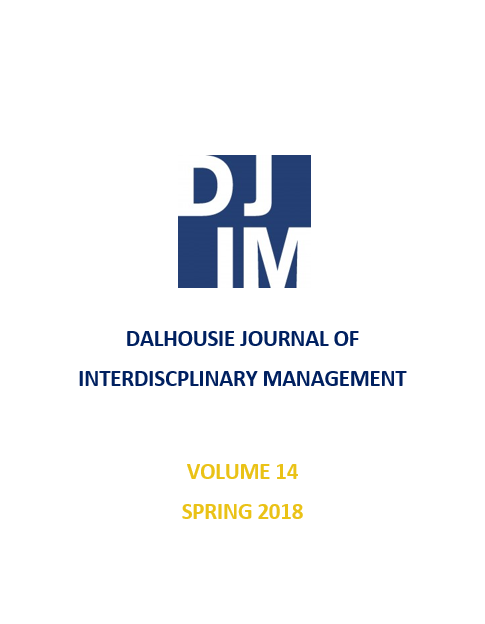Peering into the Private Lives of Judges: Reconciling Judicial Accountability and Privacy
DOI:
https://doi.org/10.5931/djim.v14i0.7872Abstract
Members of the Canadian courts are expected to maintain a rigorous degree of professionalism and good conduct in maintaining an independent, impartial and accountable judiciary. Yet, judges bring their diverse past experiences and values to bench and lead complex lives off the bench. Through examination of the judicial discipline of former Justice Lori Douglas in 2010, this paper makes a two-fold argument. Firstly, although the integrity of conduct by members of the judiciary must be held to the highest standard of public accountability, diverse backgrounds and lived experiences of judges allow for better informed decision-making and thereby, increase public confidence. Secondly, privacy of non-judicial activities ought to be protected to the extent that such activities do not erode public confidence in the judiciary. The diversity of lived experiences and backgrounds of judges is what makes the bench representative and credible in the eyes of Canadians. It is important that policies of the Canadian Judicial Council address these issues in creating workable inquiry and disciplinary procedures that truly further judicial accountability in the eyes of the public in a manner that is efficient yet mitigates harm to individual judges under investigation.
References
Arsenault-Cameron v. Prince Edward Island, 2000 SCC 1, [2000] 1 SCR 3.
Blatchford, C. Christie Blatchford on Lori Douglas scandal: Lesson may be that even judges aren‘t immune to power of sex pictures and the web. Retrieved from http://nationalpost.com/opinion/christie-blatchford-real-lesson-of-lori- douglas-scandal-may-be-that-even-judges-arent-immune-to-power-of-sex-pictures-and- the-web
Canadian Judicial Council. Statement by the Canadian Judicial Council regarding the Inquiry in to the conduct of the Honourable Lori Douglas. Retrieved from https://www.cjcccm.gc.ca/english/news_en.asp?selMenu=news_2014_1124_en.asp.
Canadian Judicial Council. (2017). Mandate and powers. Retrieved from https://www.cjc- ccm.gc.ca/english/about_en.asp?selMenu=about_main_en.asp.
CBC News. Judge Lori Douglas's offer to retire early accepted by judicial panel. Retrieved from http://www.cbc.ca/news/canada/manitoba/judge-lori-douglas-s-offer-to-retire-early-accepted-by-judicial-panel-1.2846980
CBC News. Nude Photos of Judge Contained in Compliant. Retrieved from http://www.cbc.ca/news/canada/manitoba/nude-photos-of-judge-contained-in- complaint-1.900235
Constitution Act, 1867, 30 & 31 Vict, c 3, ss 96-100.
Duff, A. S. (2004). The Past, present and future of information policy, Information Communication and Society, 7(1), 69-87. doi: 10.1080/1369118042000208906
Friedland, M. Discipline, A Place Apart: Judicial Independence and Accountability in Canada. Ottawa, Ontario: Canadian Judicial Council.
Judges Act. R.S.C., 1985, c. J-1, s 99.
Miller, A. (1970). Public Confidence in the Judiciary: Some Notes and Reflections, Law and Contemporary Problems, 35(1) 69-93. doi: 10.2307/1191030
Orna, E. (2008). Information policies: yesterday, today, tomorrow, Journal of Information Science 34(4), 547-565, doi: 10.1177/0165551508092256
Puxley, C. Former Manitoba judge compares disciplinary hearing to 'torture'. Retrieved from http://www.cbc.ca/news/canada/manitoba/former-manitoba-judge-compares-disciplinary-hearing-to-torture-1.3390836
Welch, A. Former judge Lori Douglas opens up about the hurt caused by CJC hearing. Retrieved from https://www.winnipegfreepress.com/local/Lori- Douglas-364299101.html
Downloads
Published
Issue
Section
License
Papers published in the Dalhousie Journal of Interdisciplinary Management must be the original, unpublished work of the author. Contributors are responsible for obtaining any copyright clearances required in relation to their work.
Authors submitting a paper to the Dalhousie Journal of Interdisciplinary Management automatically agree to grant a limited license to DJIM if and when the manuscript is accepted for publication. This license gives permission for DJIM to publish the paper in a given issue and to maintain the work in the electronic journal archive. DJIM also submits issues to institutional repositories and Open Access repositories.
Contributors agree to each reader accessing, downloading, or printing one copy of their article for their own personal use or research. All other copyrights remain with the author, subject to the requirements that any republication of the work be accompanied by an acknowledgement that the work was first published in the Dalhousie Journal of Interdisciplinary Management and that the DJIM Editorial Chair must be notified of any republication of a work first published in DJIM.
Dalhousie Journal of Interdisciplinary Management
c/o School of Information Management
Faculty of Management
Dalhousie University
Kenneth C. Rowe Management Building
6100 University Avenue
Halifax, Nova Scotia B3H 3J5
Canada
Email: djim@dal.ca
Authors should recognize that, because of the nature of the Internet, the publisher has no control over unauthorized copying or editing of protected works.


